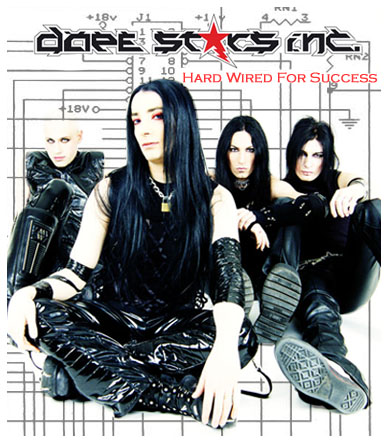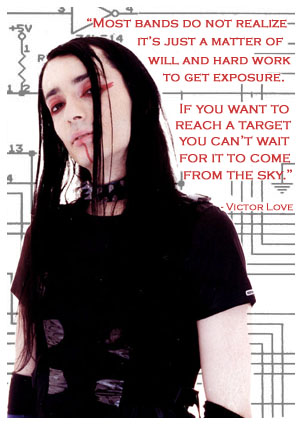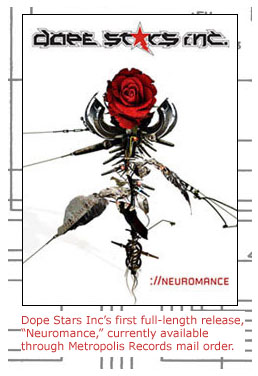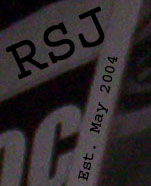 So, what's it take these days for a cyber-infatuated, vinyl-clad, electro rock band of Italian misfits to get noticed? Apparently,
some tenacious promotion and one hell of a driven frontman -- not to mention a load of undeniable tunes. With one foot unapologetically
in the guitar-driven rock arena and the other firmly planted in the synth-laden club, DSI is a unique breed that wants it
all. Either get on board or get out of the way.
Having formed in 2003, DSI made their first splash with a self-released EP, "10,000 Watts of Artificial Pleasures."
After selling out of it in days, the band, led by vocalist/programmer Victor Love, became one of the most intensely buzzed
about European acts, garnering attention from fans and the industry alike. Now, with their second release, "Neuromance,"
garnering rave reviews and sitting pretty atop the Metropolis mail-order charts, DSI is ready to take the next step. Make
no mistake, Dope Stars Inc are here for a lot of things. Being ignored is not one of them.
Rock Star Journalism: How is "Neuromance" an evolution of your sound since your first release?
Victor Love: After [the first] release, we had a lot of new experiences both on the technical and artistic side. We worked
with a lot more tools to build it up, and we worked a lot on sounds, using new synth models, testing different samples and
drumkits, testing new arrangements, sounds and effects for guitars, bass, and vocals, as well as introducing new influences
when necessary. It's normal, I think, to have an evolution when a lot of time passes by between two albums, and you have to
consider that two years is definitely a long period. After all, I think it has been worth it cause we had time to take care
of every detail, and we are really satisfied with the final result.
RSJ: In what ways did the creation of this album differ from your previous effort?
VL: First of all, our debut EP was produced with no budget in a cellar in the center of Rome where we used to go for rehearsal.
It had been written and produced in a few weeks; we just put all the ideas together and the result was so interesting that
we decided to release it as soon as possible without spending time on further arrangements and fixes on the production side.
The result was a really dirty EP with a lot of passion and roughness. And I believe it has been the key of its success too,
the reason why we received suddenly a very big feedback from media and people. It was really independent and genuine -- really
"rock'n'roll."
RSJ: How did you get involved with producer John Fryer (nine inch nails, Depeche Mode) for this release? What do you
think he brought to the table?
VL: We hooked up thanks to a common friend from the UK, and I was really surprised when such a famous producer immediately
accepted to work with us. It has been a great experience and honour to work with John Fryer, and he brought a lot of interesting
and stylish components with the additional production on the album.
RSJ: What effect did the addition of a new band member, Alex Vega, have on this album?
VL: Alex Vega brought a very cool wave-rock feel into the album, as well as recording some wonderful and dirty rock'n'roll
solos and additional guitars on most of the songs. Too bad he joined the band when a big part of recordings of "Neuromance"
already happened cause I'm sure he'd have introduced a lot more into the album both on the gothic/wave and rock'n'roll side.
Besides, he's a very talented guitar performer and already played in Klimt 1918, a wave-rock act from Rome I'm personally
a big fan of.
RSJ: Your first self-released EP sold out rather quickly. How were you able to promote yourself so well without the backing
of any label?
VL: Sometimes I do not really get the point when I see bands surprised by our "unexpected" success. They are
always bitching and wondering about some kind of secret hooks. That's cause I think most bands do not realize that it's just
a matter of will and hard work to get good exposure for their record. It's just about moving your ass and getting contacts
of magazines, radio, etc. The Internet nowadays makes things on this side even easier.
 My personal opinion about this is: if you want to reach a target, you can't wait for it to come from the sky. Use your brain,
get the contacts, and arrange a good promotional plan. And that's simply what I did. When we finished recordings of the EP,
we pressed it professionally and sent out packages to all the magazines and media. No labels, cause any label will never care
about you if they didn't hear your name somewhere else. We set up a street team, the Theta Division Corp, with a very simple
system of points and rewards, and in few weeks we had already an army of hundreds of street teamers and loyal fans promoting
DSI. When we finally put the EP for sale on our online store, together with some limited edition t-shirts, we sold out in
few days. Afterwards, it was just a matter of time, and labels started to contact us. We did not spend one cent, cause at
the end of the year we recouped all the money we spent from promotion and production from our online sales.
RSJ: After managing the band yourself successfully, why did you recently decide to enlist the services of 4RT Management?
VL: Cause when things get bigger, you need bigger guys to manage it. I'm very satisfied about the results we achieved
with Dope Stars Inc before the sign with the label and management, but the aim of all this was to find a label and management
that could carry all this work and leave us more space to focus on music. That is the most important thing.
RSJ: You mentioned receiving interest from various labels after your first release. Why did you decide to go with a German
label, Trisol Music Group GmbH?
VL: Simply cause they demonstrated to be the more professional one and the most interested one. The guys at Trisol suddenly
demonstrated to be big fans of Dope Stars Inc. and were motivated to move mountains for the band's career. And the very cool
thing is that right now, after one year of work with them and such a professional release, I can definitively say they kept
their promise and did even more than expected.
RSJ: "Neuromance" has also been doing well through Metropolis Records mail-order distribution. How did you
get involved with them?
VL: Metropolis is one of the Trisol export partners for the USA, and it was just an automatic thing to get our album distributed
by their mail-order. It has been a big honour and satisfaction for us to see "Neuromance" at the first position
in their top ten for three weeks! It's something that I doubt happened many times in the past for a band from Italy.
RSJ: Metropolis is best known for synth and EBM bands -- do you consider yourself part of this community or do you feel
that the guitar element of your music puts you outside of that scene?
VL: I feel we are part of this community cause the EBM/techno/electro influences and arrangements represent half of the
DSI style's core. But it's a really difficult topic cause we are practically in the middle of the rock and electro worlds.
We've got a strong rock'n'roll soul, as well as an industrialized/electronic core. I think we can still consider us part
of this movement, or rather a new cross-evolution of rock and EBM.
RSJ: You are also involved with another project, My Sixth Shadow. How does this band provide a different outlet for you
than Dope Stars Inc?
VL: I really love to experience different kinds of styles and work on alternative directions. My Sixth Shadow is simply
a different thing that I love to do, and to tell the truth, it has been really important for the Dope Stars Inc. creation.
If you consider that My Sixth Shadow started in '98, and I played with them as the main songwriter for five years before Dope
Stars Inc started, it is pretty obvious that all this influenced my songwriting in a lot of different ways. My Sixth Shadow
influences and experiences from the past have been really important for the construction of the DSI style, as well as new
DSI experiences will influence further My Sixth Shadow works. For example, now I am working with [vocalist] Dave on some new
My Sixth Shadow tunes, and we are improving the electro components of our sound. We are developing something influenced by
the 80's synth pop and hard rock with a modern rock attitude. The album will be released in early 2006.
RSJ: You've stated in the past that these bands are of equal importance to you. Is this still the case? Do you think
it is possible to give an equal amount of focus to both?
VL: As I said, both the bands have the same importance for me cause they influenced each other and are growing together
into something better time by time. There will never be a focus on this or that cause it would be absolutely unuseful. Each
experience just helps a musician to learn more and improve his songwriting, and I look at the projects I'm in more as different
ways to express my viewpoint in music.
RSJ: You said in a previous interview that you think "the US is probably the best territory for our music."
Why do you think this is, considering that the electronic scene is actually much bigger in Europe?
VL: Cause Dope Stars Inc is not just electronic, but has a strong rock/metal core. Our particular rock'n'roll attitude
and influences coming from American bands of the late 80's hard rock scene makes the whole sound very interesting for the
ears of North Americans. Fact is, the big part of our fanbase comes from the USA and Canada. Even our street team has a very
big army of electro dandies there promoting us all the time. But I have to say that another big community of fans come from
the UK too, and I think it happens cause of all these strong influences in DSI's style find their roots in the UK.
 RSJ: Despite being from Italy, you choose to write your lyrics in English. Why did you decide not to write any of your songs
in Italian?
VL: Cause it would have been impossible to get international exposure singing in Italian. Besides, I think that English
is really the best language for music cause of its sound.
RSJ: Considering that there is such interest in your music in the United States, do you have any current plans for a US
tour?
VL: Yeah. We really can't wait to hit the USA, and hopefully after our first tour in Europe we'll find a way to fly to
the States. We are already in contact with friends of some well-known and established bands from the States we could set up
a tour with. It's just a matter of time.
RSJ: Have you ever visited the US? What is your impression of the US industrial/electronic community as opposed to the
European scene?
VL: Never been in the States. Honestly, I've been a big fan of the US scene till some years ago, cause it was full of
very interesting and original bands. Unfortunately, I think that the US scene is suffering of the "importing styles
syndrome" from the European scene, revisiting these styles with some already well known and boring "American way"
rules. I'm not talking about the electronic scene only, but even about other genres of the rock world. There are a lot of
bands that wanna be goth, wanna be EBM, wanna be death metal, wanna be black metal, or rather we should say, wanna be European.
Americans always have this annoying tradition to assign these "wannabe bands" new spectacular genre titles, just
to not make it so evident. But, fact is, it used to be the same for Europe in the past with a lot of "I wanna sound like
an US band." That's simply how things work in the music business.
RSJ: You've cited Einstürzende Neubauten as the best industrial band you've seen from a visual standpoint. What made
them memorable for you?
VL: Their shows are simply amazing with their well-known drumkit made of pipes, metal, wires and special hand made metal
percussions. We'd like to bring something like that on stage, and we are currently working on this side for our next shows.
RSJ: The importance placed on combining visual image and music is heavily prevalent in the Japanese Visual Kei scene.
Did you ever have any interest in this community, which people often equate with the gothic scene?
VL: Yeah, and you got the point exactly. We've been inspired a lot by the Visual Kei and J-Rock scene concerning our image.
Lately, I noticed that a lot of European magazines demonstrated their interest in this scene too. Honestly, there are really
few bands that provide quality music, but about visuals they are definitely many years ahead of us. With DSI, we take care
of visuals and image as an important side of the project. With the artwork of our album, band photos and the booklet design,
we want the listener to catch the whole concept, bringing the emotions up to a higher level of understanding.
RSJ: You've mentioned the work of cyberpunk pioneer William Gibson as another inspiration. How did you first become interested
in his writing?
VL: I've always been interested since I was a teenager in the cyberpunk imagery, sci-fi books and movies, and it has been
a very big source of inspiration for Dope Stars Inc's lyrics and attitude. We named William Gibson in particular cause he
has been the source of inspiration for the title of the album too. We came up with this album name as a mix of the words "neuromancer"
and "romance." They actually represent the main themes of our lyrics -- post-industrial tales about worlds where
the human beings merge with the machines and artificial intelligence develops emotions and feelings which leads them to the
same suffering that also controls our daily lives.
RSJ: The word "cyber" is often defined many different ways as it relates to both music and culture. What does
"cyber" mean to you?
VL: Cyber comes from the word "Cybernetics," also called System Theory, the study of communication and control
processes in biological, mechanical and electronic systems. For me, cyber means everything that is associated to advanced
technologies and interactions between biological and mechanical/electronic components. That's the reason why we use to call
our music cyberpunk, cause it defines very well the modern shape of our sound, the rock'n'roll punk attitude, and the themes
expressed by our lyrics.
Got something to say about this feature? E-mail us.
|

